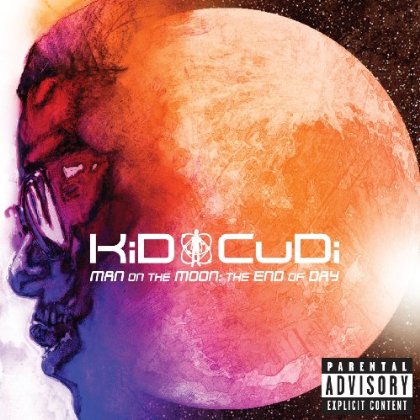While the concept of the protégé and the mentor is not one unexplored in contemporary music, it is always an interesting relationship to follow. For hip hop, this recipe has often led to the creation some of the most renowned names in the business. Kanye West summarized it best on “Big Brother,” a track from 2007’s Graduation that delves into his relationship with Jay-Z, who himself was mentored in his day by Biggie Smalls. It’s been a bit quiet over the years in terms of passing the proverbial flame of hip hop, and on the surface, it seems as though Kanye is attempting to make the play with Scott Mescudi, aka Kid Cudi.
The problem is, it’s a Hail Mary play. Simply put, Cudi is largely hit-or-miss. The Cleveland MC wears his heart on his sleeve, so much so that the blood practically soaks his entire shirt. Over the course of his highly anticipated debut, Man on the Moon: End of the Day, Cudi is frightened, vulnerable and rarely ever confident. Instead of selling coke to make a living, Cudi is a self-proclaimed pothead, using marijuana to subdue night terrors. Instead of spending the majority of his time boasting about the amount of pussy he can attain, he complains, “I got 99 problems and they’re all bitches” It’s an interesting dynamic for a rapper, and in its best moments it demands attention.
However, “demanding attention” isn’t necessarily synonymous with success. Cudi comes off as simply whiny at times, with his constant complaining being a large deterrent as the album progresses. The lyrical content of Man on the Moon acts as a psychologist’s chair more than most hip hop albums today. Cudi’s bipolar personality extends to the musical side of production as well. The album is extremely dynamic, employing the use of a wide variety of genres, from the traditional top 40 pop, sampling Lady Gaga’s “Pokerface,” to alt-rock, hiring out MGMT and Ratatat.
It is at these focused moments that Cudi succeeds, with “Pursuit of Happiness” possessing a melody and chord progression that other pop artists must be kicking themselves for not using earlier. Tracks such as “Make Her Say” are downright embarrassing, with Kanye and Common discussing the finer details of sexually using women. “Heart of a Lion” possesses Vangelis-like synths, which truly encapsulate the space-age aesthetic that Cudi wanted, and “Simple As” makes use of a hypnotic “Orchestra Manoeuvres in the Dark” sample, with a repeating mantra of “ABC/123” creating a soothing track.
In the end, this album is intended to be a representation of Cudi’s life, and is successful in this. Much like life, the album hits some serious ups and downs. However, with such a vaulting ambition, the album truly shouldn’t have as many low points as Man on the Moon does. Cudi’s ambition and work ethic is admirable, but it simply doesn’t translates to a memorable debut. There is potential lying within the depths of Scott Mescudi, but apologies to Kanye in advance: Kid Cudi isn’t carrying the hip hop flame.

